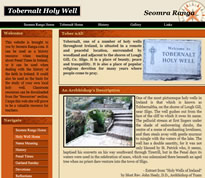
Carysfort College of Education, Blackrock, Co. Dublin, closed as a Teacher Training College in 1988
There is much discussion and debate at the moment arising out of the current difficult job situation, especially for young teachers who have recently qualified or are about to qualify this year. Many young teachers are finding it increasingly difficult to find teaching jobs for any great length of time, not to mention a maternity leave, temporary or permanent job. Many are having to make do with a couple of days substitute work here and there and, if they are lucky, a week’s work in one school. Certainly, the prospects look bleak. However, this got me thinking about when I started out on my teaching career, and the parallels with today’s situation are very similar.
I graduated with my B.Ed. from Carysfort College of Education in 1988 with very similar job prospects. I spent my first year subbing in many different schools. Both myself and a friend from college got a flat in Dublin and we walked the streets of Dublin, visiting many different primary schools with our one page CV looking for any subbing work that was going. This was pre-mobile phone era so we kept a sharp ear out for the public telephone downstairs which served all of the flats in the house, hoping to hear it ring with the offer of work. Similar to the job situation of today, we were delighted to get a couple of days teaching here and there and thought we had hit the jackpot when we got a whole week’s work in a school. However we also had a lot of “time off” and had to visit the Dole Office in Werberg Street in the city centre.
When we were lucky enough to get some work, getting paid was the next hurdle to be overcome. At that time there was a whole process to be gone through in order to get paid: the principal filled out the substitute form (sometimes this had to be sought from the priest) and signed it; then I signed it and returned it to the principal; the principal handed it over to the priest whose job it was to sign it and then forward it to the Department (you always hope that it did not sit on the priest’s desk for weeks!); the Department then issued the cheque and forwarded it to the priest!; the priest gave the cheque to the school principal who then forwarded the cheque on to the substitute. It was not uncommon to receive the cheque six weeks after leaving a school. Consequently, neither my friend nor myself had a penny to our name, living on overdrafts. I remember one principal who understood the financial position of substitutes and used to give me an “advance” out of school funds to tide me over until the substitute cheque came through.
I was lucky enough then to get a maternity leave substitute work which guaranteed a regular income for eighteen weeks, the length of maternity leave at the time. (this leave is now twenty-six weeks) After that it was back to subbing. I managed to get a temporary position for a full year during my second year out of college. I recently found an old pay cheque for that year and discovered that I was earning in the region of £340 net pay per fortnight! However, after that year it was back to subbing again, which was like starting out all over again. I was actually in my fifth year teaching before I finally managed to get my first permanent position.
I relate this story as a sort of analogy to the present job climate and as a sign of hope to the younger teachers of today, struggling to find work. The economic situation in the late eighties was very similar to the present. The country was in the doldrums and mass emigration was rife. I even got a US visa at the time and considered moving to the States. However, I persevered and eventually managed to get regular work. I hope that the younger teachers of today will not get too despondent with the work situation and realise that they will eventually, like me, manage to get a permanent position if they just remain positive and hopeful. We need younger teachers in the profession. They breathe life and energy into the profession and pass on their new ideas and methodologies to colleagues in schools. The country will always need good teachers, so I just hope that young teachers will hold firm in their beliefs that this is the profession for them.





